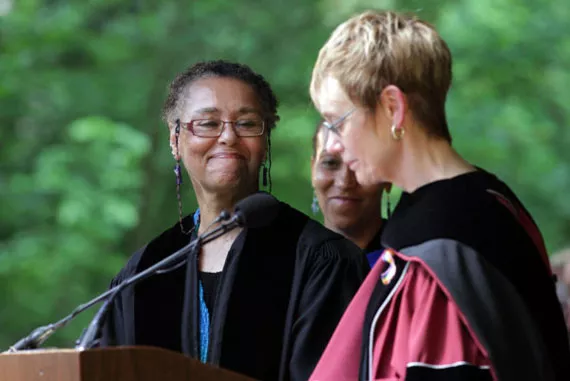President Chopp's Charge to Judy Richardson '66

Judy Richardson, you have been a civil rights activist, member of the Student Nonviolent Coordinating Committee, founder of an African-American bookstore and press, editor, author, college lecturer, and documentary film director and producer. Your PBS production of Eyes on the Prize won six Emmys and an Academy Award nomination, the George Foster Peabody Award, and the DuPont-Columbia Award for excellence in journalism. You are senior producer for Northern Light Productions in Boston, where you work on historical documentaries for broadcast and museums, with a focus on African-American historical events. Your career has been marked by distinguished public service, courage in combating racism, and creative vision in making renowned documentaries.
You came to Swarthmore with the Class of 1966 and began your life as an activist when you joined your fellow students in the Swarthmore Political Action Committee, to lobby for a fair wage for the College's cafeteria workers. The College and the country were in the throes of the civil rights movement, and you left Swarthmore during your second semester to join the Student Nonviolent Coordinating Committee, also known as SNCC, protesting segregation in Cambridge, Maryland, and Mississippi, where SNCC was attempting to make the state repeal its racist segregation laws. Your experiences with SNCC are recounted in Hands on the Freedom Plow: Personal Accounts by Women in SNCC, a book you co-edited and published in 2010. Presenting the accounts of 51 women champions of the civil rights movement, it offers a sweeping history of SNCC, including sit-ins, voter registration campaigns, freedom rides, the 1963 March on Washington, the Mississippi Freedom Summer, and the Black Power and anti-war movements. Howard Zinn remarked of the universally acclaimed book that "testimonies of these remarkable women are an indispensible part of the history of the Southern movement against racial segregation," and Julian Bond noted, "Each story is a treasure, each woman a measure of the Civil Rights Movement's strength."
For several years, you worked for SNCC with activists like James Foreman, Ruby Doris Smith-Robinson, and Julian Bond in Alabama, Georgia, and Mississippi. In 1968, between the assassinations of Martin Luther King and Robert Kennedy, you and some SNCC colleagues founded Drum & Spear Bookstore in Washington, D.C., then the largest bookstore devoted to books relevant to African Americans. Located in an area that had just witnessed devastating riots, it became a cultural center and meeting place for artists and activists.
In 1970, you began working with Blackside Productions, one of the largest minority-owned film companies of its time, founded by filmmaker Henry Hampton, and served in the 1980s as series associate producer and education director for the acclaimed 14-hour series Eyes on the Prize, a documentary of the civil rights movement. Beginning in 1982, you were the director of information for the United Church of Christ Commission for Racial Justice, participating in its protests against police brutality in New York City and its bus caravans to Alabama to protest the Reagan administration's intimidation of elderly African-American voters. You co-produced Blackside's 1994 Emmy-and-Peabody Award-winning documentary Malcolm X: Make it Plain, for PBS's American Experience.
As a senior producer for Northern Light Productions, you have continued to produce African-American historical documentaries, including Scarred Justice: The Orangeburg Massacre, 1968 for PBS; Slave Catchers, Slave Resisters for the History Channel; and the videos for the National Park Service's Little Rock Nine Visitor Center in Arkansas.
Judy Richardson, you are one of this country's civil rights heroes, an educator, filmmaker, and author. With you, creativity and courage went hand in hand. Fighting for justice, often facing grave danger, you stood up against racism in all of its forms and demanded fair treatment for African Americans across this land. Though your time at Swarthmore was brief, you have said that your activism began here. You are a model for our students who combine academic rigor, artistic creativity, and social commitment, and we are proud to claim you as one of our own.
Upon the recommendation of the faculty and by the power vested in me by the Board of Managers of Swarthmore College and the Commonwealth of Pennsylvania, I have the honor to bestow upon you the degree of Doctor of Arts.



